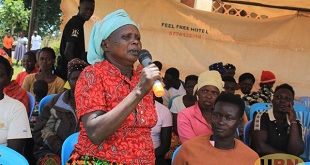
Kampala, Uganda | THE INDEPENDENT | Africa’s economies are growing strongly, but growth alone cannot meet the needs of the continent’s poorest citizens, because “nobody eats GDP,” the African Development Bank’s President, Akinwumi Adesina, has said.
His statement came as he unveiled the Bank’s flagship economic report, the 2020 African Economic Outlook (AEO) which showed that the continent’s economies are growing well, higher than the global average. The report projected a steady rise in growth in Africa from 3.4 percent in 2019 to 3.9 percent in 2020 and 4.1 percent in 2021.
According to the report, these figures do not tell the whole story. Across the continent, the poor are not seeing enough of the benefits of robust growth. Relatively few African countries posted significant declines in extreme poverty and inequality, which remain higher than in other regions of the world.
Inclusive growth occurred in only 18 of 48 African countries with data, the report revealed. But according to Adesina “Growth must be visible. Growth must be equitable. Growth must be felt in the lives of people.”
A recent outlook released by PriceWaterHouseCoopers indicated that although the Ugandan economy is now on a path of rapid and sustained growth, the number of new jobs arising from the growth has been disappointingly low.
The government projected that the economy would grow by 6.2 percent this financial year with agriculture, industry and services projected to grow at 3.8 percent, 5.6 percent and 7.8 percent respectively. The sustained growth of the economy was expected to create jobs, drive poverty reduction and make growth more inclusive.
“This means that whereas the economy is growing, this growth has not been inclusive enough as it has not translated into job creation, poverty reduction and significant wealth creation for Ugandans.”
It explains that one of the main reasons why the growth in the economy has not translated in massive growth in jobs is because, in the past ten years the growth has been originating mainly from investments in public infrastructure as well as the mining and oil and gas capital intensive sectors, rather than in traditional labour-intensive sectors such as agriculture, manufacturing and tourism.
The theme of the 2020 Africa Economic Outlook report, Developing Africa’s workforce for the future calls for swift action to address human capital development in African countries, where inclusive growth has been held back by a mismatch between young workers’ skills and the needs of employers.
The Bank’s flagship report states that increased investment in education is key as well as progressive universalism in education spending—setting high priorities for the poor and disadvantaged and focusing on basic education first where social returns are highest. Its recommendations include improving access to education in remote areas, incentives such as free uniforms and textbooks, banning child labour and improving teaching standards.
To better match skills with job opportunities, the report recommends that governments need to develop a demand-driven education system in tune with rapidly emerging jobs in the private sector, including software engineers, marketing specialists and data analysts, the report says.
“Africa is blessed with resources, but its future lies in its people…education is the great equalizer. Only by developing our workforce will we make a dent in poverty, close the income gap between rich and poor, and adopt new technologies to create jobs in knowledge-intensive sectors,” said Hanan Morsy, Director of the Macroeconomic Policy, Forecasting and Research Department at the Bank.
******
URN
 The Independent Uganda: You get the Truth we Pay the Price
The Independent Uganda: You get the Truth we Pay the Price



